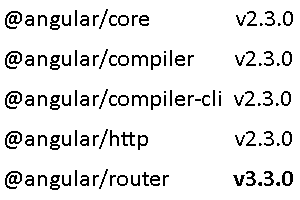Angular Evolution
Angular is an open-source web application framework created by the Angular Team at Google and by a community of individuals and corporations who have also played main role in the evolution of AngularJS priorly.
- Enforce on building mobile and web applications with primary emphasize on speed and performance.
- Introduces the concept of SPA(Single Page Application).
- Written in Microsoft’s TypeScript language, which is a superset of ECMAScript 6 (ES6).
Versions
AngularJS OR Angular 1.x.
- AngularJS also named as Angular 1.x or Angular.js
- Initially released in Oct 2010.
- Written in Javascript. It is simply a minified js file that we can place in the header section or can be added to an HTML page of our website in same manner we put any other js library like jquery.min.js file with a <script> tag .
- Based on Model-View-Controller design and uses POJO (Plain Old JavaScript) objects(means no need of getter/setter functions).
- Provide two way binding between model and view.
- Added logical concepts like expressions, filters, directives(extends HTML attributes) , modules, and controllers .
Angular 2
- Version was released on September 14, 2016
- It is completely rewrite of AngularJS from same team with advance features.
- Mobile friendly which was lacking in AngularJS.
- Provide more choices for languages like S5, ES6, TypeScript or Dart to write code in it.
- Follow component based architecture. Supports Dependency Injection, Routing, Templates, Modules and Services.
Angular 3
- Angular 3 was skipped because Angular Team was willing to synchronize Angular version with the Angular router versions as shown in screenshot below:

- Because of lot of work and development in the router section. It’s version was greater than any other.
- Now they thought, if they plan to launch the Angular 3 with router version 4 then it might arise confusion among the dependencies in future. So, to overcome it they skip releasing of Angular with version 3.
Angular 4
- Was released in March 2017.
- No major differences found among Angular 2 and 4.
- Compiles Typescript to JavaScript to make it friendly by browser.
- Add on HttpClient library and Browser Animation Module.
- Support if/else statement and email validator
- New features and advancement reduce the application size by bundling the necessary files with original code written in multiple files into a common or single file thus increases the performance.
Angular 5
- Angular 5 was released in November 2017
- Replace @angular/http with @angular/common/http library.
- Improved compiler and typescript.
- Router Hooks
- Compatible with Material Design Components
- Number, date and currency pipes update that increase standardization across browsers and cut off the need for i18n polyfills.
Angular 6
- Released in May 2018 with Angular CLI 6 and Material 6.
- Provide multiple validators for form builder.
- Provide RxJS (Reactive Extensions for JavaScript) reactive programming.
- Introduces ng update command to updates application and its dependencies.
- Provide ng add to add new package/module to the application.
Angular 7
- Released in October 2018.
- CLI Prompts have been updated to v7.0.2 with additional features like it will prompt users while typing commands such as ng-new, ng-add and routing in support to inbuilt features.
"routing": {
"type": "boolean",
"description": "Generates a routing module.",
"default": false,
"x-prompt": "Would you like to add Angular routing?"
},- CLI Prompts have been added to Schematics, so that any other package can take benefit by adding an
x-promptkey while publishing Schematics. - Introduced minor visual updates & improvements in Material Design.
- Support Drag and Drop feature, Virtual Scrolling.
- Many developers were including the reflect-metadata polyfills.ts in production, which is only needed in development. So v7 will automatically removed this from
polyfills.tsfile, and then include it as a build step when building your application in JIT mode. Thus removing this polyfill from production builds by default and provided improved performance.
Angular 8
- Released in May 2019.
- WebWorker Support can be used to speed up web applications in cases like (image or video manipulation) where application required CPU processing more.
- Provide Work Space API to easily read and modify
angular.jsonfile without being need to manually open and modify it, while developers using Schematics. - Introduces
LocationUpgradeModulethat provides a unified location service which shifts responsibilities from the AngularJS$locationservice to the AngularLocationService. - Dynamic Imports by introducing lazy load module that use
loadChildrenkey in route configuration.
{path: 'admin',loadChildren: () => import('./admin/admin.module').then(m => m.AdminModule)},